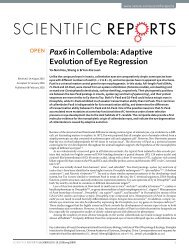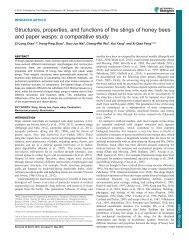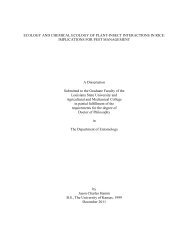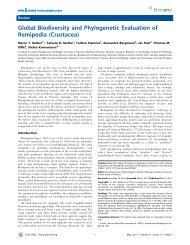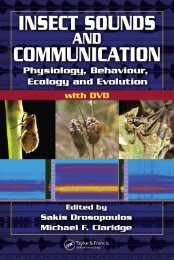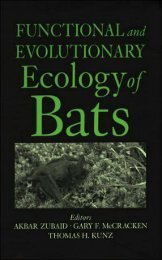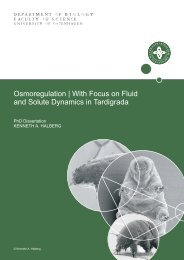Create successful ePaper yourself
Turn your PDF publications into a flip-book with our unique Google optimized e-Paper software.
296 IV. DE ARACHNOLOGIA<br />
Simou meant by "true", or to have realized that he was too sound a<br />
scholar to have written anything so foolish. If his successors had<br />
remembered the Latin that they learnt at school, or, in the absence of<br />
such a luxury, had looked at a dictionary, they would have found that<br />
Araneac verae should properly be translated as "ordinary spiders".<br />
By thus contrasting the familiar spiders of the countryside with the fourlunged<br />
diggers of silk-lined burrows, Simon was making a clear and<br />
sensible distinction.<br />
In 1892 Pocock gave the Araneae verae the name of Arachnomorphae.<br />
This was almost invariably used until 1933, when it was criticized on<br />
the grounds that it might lead to confusion with the name of the class. It<br />
was displaced by Araneomorphae, which empirically is as likely to be<br />
confused with the name of the genus Araneus. It is also one of the obnoxious<br />
hybrids that too often come into misshapen existence, and should<br />
never have been allowed to appear in print. Arachnologists, like other<br />
scientists, are often compelled to make new words, and they should be<br />
encouraged to make them well, not badly. There is no merit in deliberate<br />
malpractice.<br />
Some authors have taken to writing "1\:lygalomorpha" and "Arachnomorpha".<br />
Now morphe makes the plural morphai, which can only be<br />
transliterated into -morphae. V\'hat mental kink suggested this change is<br />
obscure.<br />
A similar step has been taken by those who have written "Cribellata"<br />
and "Ecribellata", saying that these spellings are "preferable" to the<br />
usual Cribellatae and Ecribellatac. No reason for the preference is<br />
given. The words can, of course, only be construed as adjectives, qualifying<br />
the noun araneae, understood. Araneae cribellatae is analogous to<br />
Simon's Araneac verae. Long-standing custom has justified the dropping<br />
of the noun: we speak, for example, of gastritis, arthritis and so on,<br />
when these words were originally adjectives, qualii)ring nosos, a disease.<br />
Gastritis nosos meant a disease affecting the stomach. To put these<br />
words into the form suggested is pointless, or worse, since Cribellata, by<br />
itself, can only mean either "a small-sieved woman" or "small-sieved<br />
things", and l\:lygalomorpha means nothing, except that the writer,<br />
like Shakespeare, had little Latin and less Greek.<br />
The cribellum seems to have been devised by a malicious evolutionary<br />
jinx to give trouble to arachnologists. The organ is to be described<br />
as a small sieve, and the Latin for sieve is cribrum. Diminutives in Latin<br />
are made by adding the suffix -ulus, as in puerulus, a little boy, or -cellus,<br />
as in navicella, a little ship. This cribrum might give either cribulum<br />
or cribrellum, and certain authors have, in fact, used the latter form.<br />
There is, however, sufficient precedence for the dropping of the second<br />
r, most familiarly in the word cerebellum, a little brain, from cerebrum, a<br />
35. LINGUISTIC ARACHNOLOGY 297<br />
brain. I have never seen the word cerebrellum, and do not think that<br />
cribrellum is to be encouraged.<br />
The spinneret, metaphorically described as thele, a teat, produces<br />
another curiosity. There are two genera of spiders whose names indicate<br />
that they possess six and seven spinnerets respectively. One of these has<br />
been named Hexathele and the other Heptathela. The former is an<br />
exact transliteration of the Greek, but leaves the word in the singular,<br />
"six-spinneret". The latter has converted the Greek into the latinizcd<br />
form thela, and so has produced a hybrid that might better ha\·e been<br />
written Septemthela.<br />
A word that suffers from uncertainty in the minds of its users is<br />
sensillus. It may be found with all possible spellings as sensillus, sensilla<br />
and sensillum. In one standard textbook it appears in the text as sensillum<br />
with its plural sensilla, which in the legend to the text figure<br />
becomes sensillae ( !)<br />
The word seems to be a diminutive from sensus. The suffix -illus is an<br />
alternative to -ulus or to -ellus, rather less commonly used; but compare<br />
putus, which makes putillus, a little boy. It follows that the correct word is<br />
sensillus, plural sensilli; other forms, including "sensor" are to be avoided.<br />
The matter of inconsistency or of unexplained changes has been mentioned<br />
by Kaston (1974). He instances the names that Petrunkevitch<br />
gave to some of the higher taxa: the Dionycha and Trionycha of 1928<br />
became Dionychae and Trionychae in 1933 and again Dionychi and<br />
Trionychi in 1955. Similarly, the Hypochilomorphae and Quadrostiatae<br />
of 1933 appeared in 1958 as H ypochilina and Quadrostiati. Kaston<br />
concludes,·,"! am unable to suggest an explanation of all these changes".<br />
The preceding paragraphs seem to justify the sneer that since scientists<br />
are traditionally supposed to be unable to write good English, it is<br />
unrealistic to expect them to write good Latin, or even to write Latin at<br />
all if they can manage to avoid it. This is achieved by the habit of<br />
anglicizing the names of taxa by dropping the final syllable. Thus we<br />
read of "liphistiid spiders", spelt with a small l or of "galeodids'',<br />
"gongyleptids" and so on, throughout the whole of arachnid taxonomy.<br />
The device may be meant to ease the acceptance of strange names:<br />
perhaps it does so.<br />
The high reputation of a science such as ours deserves, in every respect<br />
nothing but the best. Are we not arachnologists?<br />
Are we? "Arachnology" must, from its derivation, be the science or<br />
study of spiders: the word cannot accurately be applied to students of<br />
scorpions, harvestmen or any of the other orders. The comprehensive<br />
science should be "arachnidology", a word which, I am glad to say, I<br />
have seen in print only once. Few of us are arachnidologists; most of us<br />
wisely limit ourselns to the one order that particularly fascinates us.




